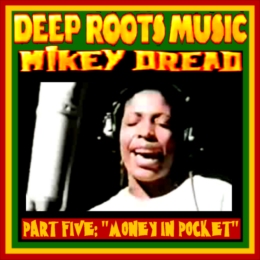The time was hot. Politics, crimes, violence, people suffered big time. Something had to be done and the King of Reggae was needed. However, Bob Marley was in the UK. He was there for a reason too: he merely survived after having been shot himself.
Leaders went to the UK and asked Bob Marley to help them out. The result was the now famous One Love concert, where Bob Marley managed to have the two main political leaders, that split the country in two, shake hands together.
We see the historical recordings, and are then taken to an interview with both political leaders. How do they think about it all, looking back? We see and hear them as they speak about Bob Marley, Reggae, and the influence on the political and social situation.
One of them, before getting into politicks, was also in the music industry. He worked with Prince Buster and Duke Reid, but also with Dennis Brown, the singer who gave the name to this episode of Deep Roots.
Time to take a closer look to the Music Business. National and international. We meet up with the major distributor during a business talk over the phone. We meet up with producer Harry J in the studio, too, as he records one of the top female singers.
The tapes are rolling, as the sistren sings words of wisdom into the microphone. Producer and engineer are listening concentrated: this has to be recorded with the highest care.
Harry J's studio has an Ire Sound, which attracted Bob Marley and the Wailers. In an interview, he speaks about his own history as well as that of Bob Marley as they used his studio. Just a year after he started off in 1971, they already wanted him and in 1972 Catch a Fire was recorded in Harry J's.
This is also where Chris Blackwell enters, the former owner of Island Studio's who was influential in selling Reggae Music to a western audience, by adding all kinds of things to the raw rhythm. This is where Reggae was indeed made ready for a world wide audience.
We also hear about a huge argument between the three original Wailers: Bob, Bunny and Peter. Chris Blackwell then decided to record Bob Marley separate from the others. This happened during the recording of Burnin', the second album. Harry J was there, when the Wailers became Bob Marley and the Wailers with the I-Three's on backing vocals. We see live performances Rita, Marcia and Judy as well.
With shots of Randy's, the record store, Mikey Dread introduces us to another influential female in Reggae Industry: Sonia Pottinger, aka Mrs. P. As she sits behind her desk, she tries to explain that for her there is a big difference between business and religion. Business, being the music of course.
We then turn to Marcia Griffiths, who is sitting there with Mrs. P. Before she joined Bob Marley's backing vocals, she was around Sonia Pottinger who had already told her that her voice would get her far. She tells us about the influence of Bob Marley and the Wailers, of Reggae, of Music. But when she's asked about her religion, she looks at Mrs. P and smiles, saying: "I don't wanna talk about it".
We also meet up with Dennis Brown. The songwriter is announced as the Prince of Reggae, as he sings in the studio with only a guitar to accompany himself.
From the Recording Studio to the Radio Studio, where a young Deejay is waiting to give some crucial Rub a Dub style toasting Live and Direct.
Back to the Recording Studio. Dennis Brown is ready, waiting to voice another crucial riddim, this time without guitar. Shots from the impressive mixing board in the Studio that is getting rather cloudy...
When the session is over, Dennis Brown is interviewed. He speaks about his time at Studio One, which for him was like a college. Coxsone's Studio is where things took place back in the 1960's, and as Dennis brings up memories, shares reasoning and singing a bit it becomes clear where the Prince Of Reggae coming from.
Towards the end of this fifth episode of Deep Roots, Dennis Brown talks about the song that gave the title to this hour, after which he ends with a cry for repatriation.


